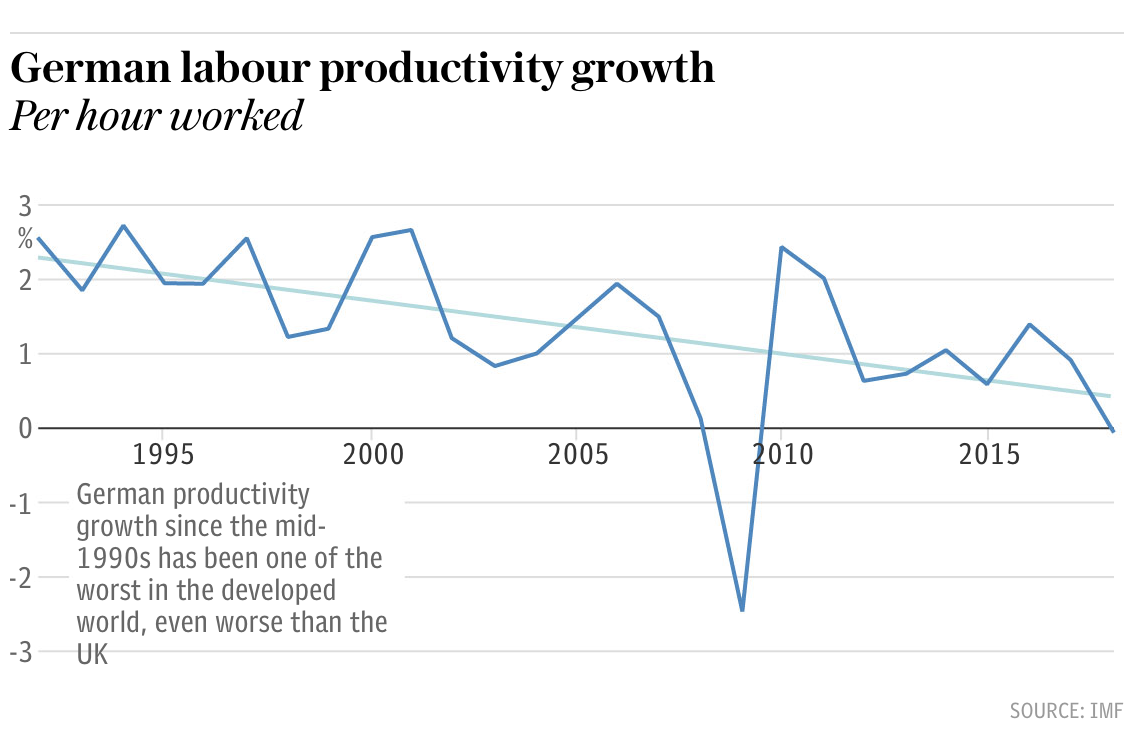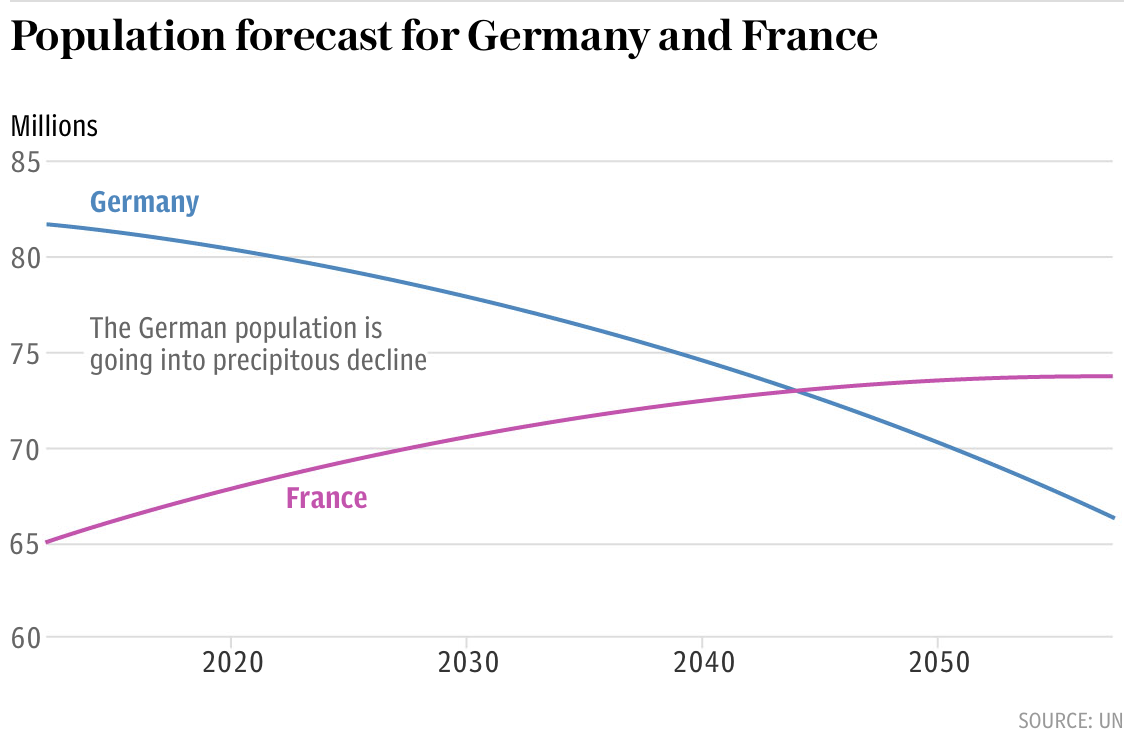Die Deutschen verdrängen die bittere ökonomische Realität
Meine kritische Sicht auf die Lage in Deutschland ist hinlänglich bekannt. Ambroise Evans-Pritchard beschreibt es aus der Perspektive des Auslands. Es ist interessant zu sehen, wie sich die Erkenntnis immer mehr durchsetzt, dass wir es in der Tat mit einer Strukturkrise zu tun haben, die meines Erachtens das gesamte Gesellschaftsmodell unseres Landes gefährdet. Die konsequente Erosion der ökonomischen Grundlagen gepaart mit steigenden Belastungen aller Art erreichen den Punkt, an dem es kippt. Sobald das der Fall ist, beginnt ein Kollaps, der wohl nicht mehr umkehrbar ist.
- “While the British are gambling wildly on political and economic upheaval – full of dangers, yet also breath-takingly bold – the German people are doubling down on ideological certainties, a 20th Century pre-digital model, and the status quo. There is a whiff of the Brezhnev era about the long cautious reign of Angela Merkel. Some Germans are vaguely aware that Deutschland Inc is no longer entirely fit for purpose but there is no sense of urgency.” – bto: So kann man es sagen. Vor allem die ideologischen Gewissheiten dürften uns in den kommenden Jahren das Genick brechen.
- “‘We’re living in cloud-cuckoo land. We think we are the superstars and that other Europeans should follow our example,’ said Marcel Fratzscher, president of the German Institute for Economic Research in Berlin (DIW). ‘If you compare us with southern Europe or Italy we look fantastic. Compared to the Nordics we don’t look so good at all,’ he said.” – bto: der Fratzscher! Natürlich ärgere ich mich, dass hier Fratzscher zitiert wird und nicht ich. Trägt doch Fratzscher wie wohl kein anderer Ökonom zu dem Zerrbild in Deutschland bei, betont er doch die falschen Themen (Ungleichheit) und verteidigt die Politik der EZB, ohne zu erklären, wie diese denn die Probleme lösen soll. Er ist sicherlich einer der intellektuell Hauptverantwortlichen für die gigantische Wohlstandsvernichtung der letzten Jahre.
- “Germany has been one of the world’s slowest growing economies over the last twenty years. East Asia, the Anglosphere, and Scandinavia have done better. Much-mocked Japan has done better. The Bundesbank says Germany’s trend growth rate is heading for 0.75pc by 2021 if productivity continues to stagnate. OECD data shows German labour productivity growth has averaged 1.2pc since 1995 (it was zero last year.) This compares to France (1.2pc), the UK (1.3pc), Australia (1.5pc), the US (1.7pc), and Korea (3.9pc). Has the euro really done any favours for Germany, or has it been a trap?” – bto: Wir wissen, dass der Euro Deutschland massiv geschädigt hat! Er hat unsere Wettbewerbsfähigkeit unterminiert und wir haben unsere Ersparnisse im Ausland schlecht angelegt.

Quelle: The Telegraph
- “Germany was briefly able to ride the ‘China wave’, becoming the supplier-in-chief of machine tools and capital goods for the industrialisation of Asia. (…) the Lehrer has outgrown the Meister. China is increasingly exporting products that coincide with Germany’s top export categories (…) The annihilation of Germany’s solar champions by Chinese upstarts – with stolen technology and export subsidies – shows how fast the tables can turn.” – bto: Es zeigt aber auch die tödliche Wirkung von Subventionen hierzulande. Es schwächt die Innovationsfähigkeit und lässt die Unternehmen die Grundsätze für erfolgreiches Wirtschaften, in diesem Fall Volumen-Effekte, vernachlässigen.
- “Trade dependency on China has become Germany’s Achilles Heel. (…) a permanent 10pc decline in exports to China would cut German GDP by 4.8pc within a four-year period. This damage is already becoming visible. Germany has been in recessionary conditions on and off since early 2018. Each time the Chinese stimulus stimulus cycle fades – and the impulse is becoming progressively weaker – the German economy wilts.” – bto: Auch auf diese Abhängigkeit von China bin ich im Märchenbuch ausführlich eingegangen. In der Tat sind wir so schlecht aufgestellt.
- “(…) The Germans pride themselves on engineering excellence and they have been wizards at it since the late 19th Century. But that technology is becoming obsolete (…) We are on the cusp of a fundamental change in the way the world produces and distributes things and I don’t think German society recognises how deep the problem is.” – bto: Nein, denn nur so kann man sich die hiesigen Themen erklären. Medial werden wir mit allen möglichen mehr oder minder wichtigen Themen bombardiert, nur nicht mit der Existenzfrage unseres Landes.
- “(…) public investment has been negative almost every year since the early 2000s and is still negative. (…) Most investment is carried out by the Lander and municipalities. Many are broke, including the 18m-strong Nordrhein-Westfalen (…) over indebted and close to default.” – bto: Es ist die politische Misswirtschaft der letzten Jahrzehnte, die sich jetzt rächt. Abgewirtschaftet.
- “This structural corrosion has been masked by monetary union. ‘Life can get very comfortable when you have a massively undervalued currency,’ said Charles Dumas from TS Lombard. (…) The dark side of Germany’s export miracle is little understood abroad. It relies on a tax, energy, and regulatory structure that favours the exporting elites at the cost of the bottom half. The pre-Merkel Hartz IV policies of wage compression caused real pay to drop back to the levels of the late 1990s.” – bto: Immer wieder habe ich darauf hingewiesen, dass wir mit dem Euro letztlich ein System zur Subventionierung unserer Exportwirtschaft haben, das wir alle bezahlen.
- “The legacy is a lumpen-proletariat of 7.8m people on ‘mini-jobs’, part-time work up to €450 a month. Companies love it because of tax concessions. This underemployment flatters the jobless rate. It has left Germany more unequal than at any time in its modern history. Prof Fratzscher the percentage in poverty has risen from 12pc to 17pc since 2005. Two fifths of Germans have no net wealth.” – bto: Fratzscher, wie er aufblüht. Denn wir wissen, dass die Armutsquote ausschließlich aufgrund der Zuwanderung gewachsen ist. Das gibt sogar mittlerweile das DIW zu, was den Chef aber nicht daran hindert, die ihm genehme politische Message zu verbreiten.
- “Nowhere is Germany’s predicament more obvious than in cars. German industry misread the Tesla threat and clung to the combustion engine for too long. (…) Electric vehicles are computers on wheels. The advantage switches to California. Or equally you might say they are batteries on wheels, and the advantage switches to Asian companies like Korea’s LG Chem and Samsung SDI, or China’s CATL, which have locked up lithium supply. These rivals now produce the power packs for VW and BMW and capture much of the value added. (…) Will Germany’s great auto industry support an army of 870,000 workers and an economic ecosystem of millions in ten years time?” – bto: Das ist die entscheidende Frage und die Antwort liegt angesichts der Politik auf der Hand. Nein, wir werden den Niedergang erleben, weil wir ihn politisch befeuern. Die Planwirtschaftler aus der Politik wissen es ja besser und wollen nun der Industrie den Weg in die Zukunft vorschreiben. Elektro muss erst beweisen, dass es weltweit funktioniert. Gut möglich, dass wir uns so umstellen, dass wir viel weniger Autos benötigen. Schwer denkbar, dass dies in den USA passiert. Und damit ist klar, dass es große Märkte geben wird, die mehr Antworten brauchen. Ich denke, es ist höchst rational für die deutsche Industrie, in diese Regionen auszuwandern.
- “The euro years have been a lost era for Germany. The chance was missed to future-proof the country by investing in the next wave of technology before its turns old.” – bto: Und die Politik hat das Geld für soziale Wohltaten verschwendet.
- “It drifted off too long and now its demographic dividend is reversing with a vengeance. The Bundesbank says the workforce will shrink by 200,000 a year from now on even under any plausible scenario of immigration. The old-age dependency ratio will rise from 26.5pc to 39.3pc by 2025, before spiraling above 50pc by mid-century.” – bto: vorgesorgt? Nein, das haben wir nicht.

Quelle: The Telegraph







